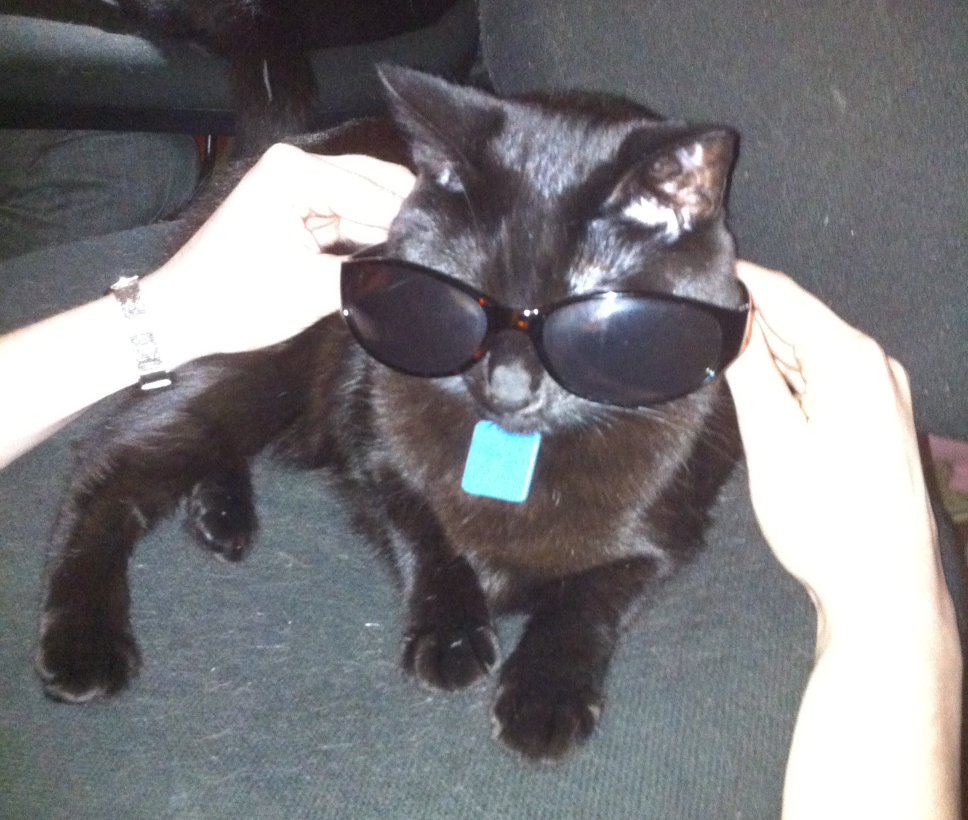Today’s post is going to end up being rather long and grammar-heavy. Some readers will probably dig that, but it may be a bear for others, so by way of making amends, here is a picture of my cat Keli wearing sunglasses:

From now on whenever you think of relative clauses, I hope you will think of the coolest cat on the planet (and that, of course, would be my cat).
Relative clauses are clauses which modify a noun. Here are some examples in English (with the relative clauses underlined):
- The goat who loves me.
- The octopus that I saw eating Twinkies.
- The jaguar I gave a camera.
- The penguin I saw Driving Miss Daisy with.
- The duck whose uncle I tased at the Super Bowl.
In each case above, the modified noun plays some sort of role in the relative clause. Those roles are:
- Subject: the goat is the one doing the loving.
- Direct Object: the octopus is the one I saw.
- Indirect Object: the jaguar is the one I gave a camera.
- Object of a Preposition: in this case, the penguin is the object of “with”.
- Possessor: the duck is the one that has the uncle I tased.
English is quite permissive in its relative clauses. You can relativize almost any role. Some languages are less permissive, allowing you to relativize only certain roles. In Kamakawi (a language of mine), for example, only subjects can be relativized (below, ana is “duck” and topu is “shout”; for more on relative clauses in Kamakawi, go here):
- Ana poke topu i’i. “The duck that called me.”
- Ana poke topu’u ti’i. “The duck that I called.” (lit. “The duck that was seen by me.”)
- Ana poke topuku’u ti’i. “The duck for whom I shouted.” (lit. “The duck that was shouted for by me.”)
For Dothraki, I decided to “simplify” things (which, in all cases having to do with Dothraki, means “make things closer to English” [though English itself is far from simple]). I actually did this in several places on purpose. Dothraki is quite different from English, but it could have been differenter, if you’ll allow (though my spellchecker says that word is licit! How ’bout that…). I figured if people were going to try to use Dothraki, many would be at least familiar with English, so in order to make some rather foreign choices in some places, I dialed it back in others. The Dothraki relative clause is one of the places I dialed it back a bit.
In Dothraki, a bare noun of any case (in the embedded clause) can be the target of relativization, as can a noun that’s the object of certain (but not all) prepositions. To form a relative clause, one puts a relative pronoun whose animacy matches the animacy of the head noun directly after the head noun in the matrix clause. That relative pronoun takes on the case the head noun would display in the embedded clause. After that, one writes up the embedded sentence using VSO word order and with a gap where the relative pronoun would be.
That might be a bit much to digest, so let me illustrate with some examples. First, I’ll go through two simple examples: one where the target of relativization is a subject in the embedded clause, and another where it’s the direct object:
- Adra fin tih anna. “The turtle who saw me.”
- Adra fines tih anha. “The turtle whom I saw.”
The first sentence (where the turtle is the subject of the embedded clause) is pretty much identical to English; the second is a little different. Specifically, you’ll notice that the subject, which ordinarily precedes the verb in Dothraki, follows the main verb of the embedded clause. The reason it does so is the word order of embedded clauses reflects the older word order of Dothraki, which was VSO. This is often the case with natural languages (relative clauses are often a way to take a glimpse into the past).
In the case of Dothraki specifically, the pre-verbal position was, for many hundreds of years, a topic position. When the word order was VSO, a noun could be dragged up front in order to topicalize it. As time passed, the topic and subject positions became synonymous. In the case of relative clauses, though, since the relative pronoun occupies the topic position, the subject remains in situ. In matrix clauses in the modern language, you can actually get pre-subject topics (now that the pre-verbal position is the subject position), giving Dothraki stylistic word order variants of both OVS and OSV.
Hopefully that’s pretty clear. Now here are some other examples of relative clauses with nouns taking on different roles (note: some of the sentences below will require you to believe that a turtle could own and perhaps wield an arakh):
- Adra fini tih anha arakh. “The turtle whose arakh I saw.”
- Adra finnaan azh anha arakh. “The turtle I gave an arakh to.”
- Adra finnoon ahajanak anha. “The turtle I’m stronger than.”
That last example, in addition to showing the ablative of the relative pronoun, also shows that comparands can serve as targets of relativization (something which not all languages allow [partly depending on how they handle comparison]). Similar examples can be formed with inanimate nouns, but the inanimate form of the relative pronoun is used. Here’s the declension patterns of the animate and inanimate relative pronouns:
| Case | Animate Relative Pronoun (SG/PL) |
Inanimate Relative Pronoun |
|
|---|---|---|---|
| Nominative | fin | fini | fini |
| Accusative | fines | finis | fin |
| Genitive | fini | fini | fini |
| Allative | finnaan | finea | finaan |
| Ablative | finnoon | finoa | finoon |
Lastly, I mentioned that the objects of certain prepositions could be relativized as well. This is true, but it involves a construction which is probably one of the least familiar aspects of regular Dothraki grammar (to English speakers). In Dothraki, many prepositions can be used pronominally (or adverbially… I’m not sure which it is, honestly. I think it’s pronominally) when the noun phrase it modifies is a pronominal argument already present in the discourse. That may sound complex, but actually the easiest way to illustrate how it works is with a relative clause.
Let’s start with a sentence like the following:
- Adra zimeme mawizze ma fesoon. “The turtle distracted the rabbit with a carrot.”
That’s pretty straightforward. Now what if you wanted to say something about that carrot? Here’s what you would do:
- Anha tih fes finoon zimeme adra mawizze memas. “I saw the carrot the turtle distracted the rabbit with.”
First, the relative pronoun is put into the case it would have been assigned had it been preposed by the preposition (in this case, since the preposition is ma, which assigns the ablative case, the relative pronoun is in the ablative). Next, the preposition is put into its pronominal (or adverbial) form and stands for the whole prepositional phrase.
In English, we actually do have vestiges of a system like this, but the language is, often, considered stilted or antiquated. For example, if the carrot were already under discussion, we might say, “And the turtle distracted the rabbit therewith”. In Dothraki, rather than fronting the preposition (e.g. “I saw the carrot with which the turtle distracted the rabbit”) or stranding it (as above), the preposition is left in situ and put into this special pronominal form.
As I mentioned, not all prepositions work like this. Here’s a list of Dothraki prepositions that do work this way:
| Dothraki | English | Pronominal Form |
|---|---|---|
| ha | for, from | mehas |
| irge | behind, after | mirges |
| ki | by, because of | mekis |
| ma | with | memas |
| mra | in, into, inside | memras |
| oleth | over, above | molethas |
| she | on top of, on, at | meshes |
| torga | under, underneath, below | metorgas |
| vi | between, among, through | mevis |
When a preposition that doesn’t fit this pattern is used, a pronoun coreferent with the relative pronoun must be put in what would otherwise be a gap. It doesn’t sound great, though, so it’s usually advisable to try to reword the clause, rather than to resort to using the copy pronoun. Here’s an example:
- Adra finnoon drivo anha haji moon. “The turtle for whom I died.” (lit. “The turtle whom I died because of him.”)
It’s not nearly as bad in Dothraki as the literal translation above is in English, but it’s not as elegant as other relative clauses that use the pronominal form of a given preposition, so if possible, it’s to be avoided.
As a final note, the distinction between the animate and inanimate relative pronoun is likely on its way out of the language. The default is becoming the inanimate relative pronoun (whose declension paradigm is simpler), and using it with an animate head noun is no longer as ungrammatical sounding as it once was.
That is almost all you’d ever need to know about relative clauses in Dothraki. This post is quite long as is, so I won’t go into indefinite relative clauses (I’ll save that for another time).
Oh, but as one last note, the post-subject verbal modifiers come right after the relative pronoun, if present, e.g.:
- Adra fini ray tih anha arakh. “The turtle whose arakh I already saw.”
Aside from the indefinite relatives, that should be just about everything. Thanks for reading!

My head just exploded. That’s all…
Oh, lol. And I forgot that the animate relative pronoun is irregular in the singular… Whoops! Better fix that.
Oh. So how about rek, haz and jin? Also the similar irregular allative and ablative?
The animate versions of those are actually rekak, hazak and jinak.
Super. A true grammar lesson … Do pronominal preposition forms work with passives and reflexives, too? Do post-subject verbal modifiers still generally follow the subject regardless of word order and topic? Do questions with fin follow the same rules as relative clauses? … In Dothraki, many adjectives can be used pronominally Your almost dependable un-understander finds another queer spot. Huh?
Do pronominal preposition forms work with passives and reflexives, too?
Not sure I understand the question. They work wherever they work. They’re not dependent on any type of syntactic structure: they just need to be modifying a noun that’s already in the discourse.
Do post-subject verbal modifiers still generally follow the subject regardless of word order and topic?
Unless you’re treating the relative pronoun like a subject in the embedded clause (which would, I think, be a mistake), the answer would have to be no.
Do questions with fin follow the same rules as relative clauses?
Generally no (they’ve changed with time; just the relative clauses were frozen). VSO word order’s still likely to be available as a stylistic variant, though.
In Dothraki, many adjectives can be used pronominally.
No, no: My dependable typo finder found another typo. That, of course, should have been “prepositions”, not “adjectives”. My mind must have been on other (adjectival) things…
That, of course, should have been “prepositions”, not “adjectives”. My mind must have been on other (adjectival) things…